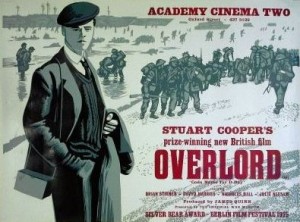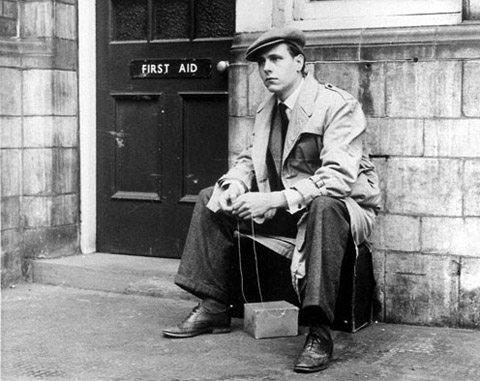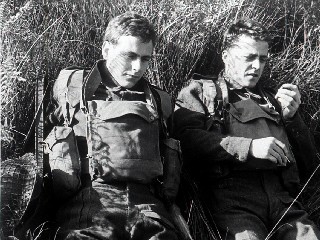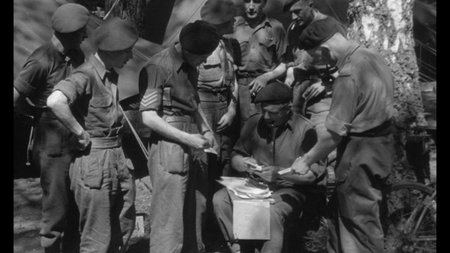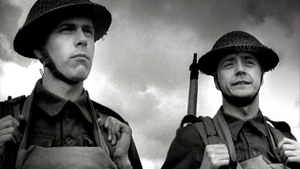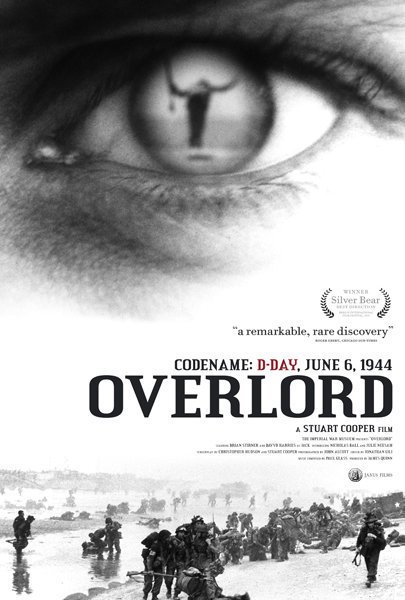Criterion has just released Overlord on Blue-Ray. Here are my two separate reviews of the film, written over three decades apart — for Monthly Film Bulletin, September 1975, Vol. 42, No. 500, and for the Chicago Reader, June 2, 2006. — J.R.
Overlord
Great Britain. 1975
Director: Stuart Cooper
Cert–A. dist-EMI. p.c–Joswend. p–James Quinn. p. manager—
Michael Guest. sc–Stuart Cooper, Christopher Hudson. ph–John
Alcott. optical effects–Vee Films. ed–Jonathan Gili. a.d–Michael
Moody, Barry Kitts. m–Partl Glass. songs–“The Lambeth Walk” by
Douglas Furber, Noel Gay; “We Don’t Know Where We’re Going” by
Ralph Butler, Noel Gay, sung by Nick Curtis. costume advice–Laurie
Milner. titles–Ann Hechle. sd. ed–Alan Be1l. sd. rec–Tony Jackson.
sd. re-rec–Gerry Humphries. l.p–Brian Stirner (Tom), Davyd Harries
(Jack), Nicholas Ball (Arthur), Julie Neesam (Girl), Sam Sewell (Trained
Soldier), John Franklyn-Robbins (Dad), Stella Tanner (Mum), Harry
Shacklock (Station-master), David Scheuer (Medical Officer), Ian Liston
(Barrack Guard), Lorna Lewis (Prostitute), Stephen Riddle (Dead German
Soldier), Jack Le White (Barman), Mark Penfold (Photographer), Micaela
Minelli (Little Girl), Elsa Minelli (Little Girl’s Mother). 7,504 ft. 83 mins.
England, 1944. Receiving his call-up papers, Tom says goodbye to his
parents and his cocker spaniel Tina before boarding a train for his camp.
Bewildered and beleaguered by the ordeals and rituals of basic training,
he befriends Arthur, a fellow recruit, who talks about his girlfriend back
home and encourages Tom to enjoy a little love-life when and where he
can. In a cinema, Tom is importuned by a prostitute but flees from her.
With the other men, he is taken to the coast for further training and to
become part of the general Allied build-upfor the Normandy invasion.
In a village dance hall he meets a girl whom he takes for a walk, kisses
and promises to see again. But soon afterwards he is taken away by
truck with his mates Arthur and Jack to the marshalling area.
Reaching the age of twenty-one and having premonitions that he
won’t survive the war, Tom writes a letter to his parents, makes out
a will, and has his hair cut and his photograph taken. Just before
D-Day, he burns all his personal papers with the other men. On a
landing craft with Jack and Arthur, he recalls a visit with the latter
to a run-down deserted theatre where a little girl was singing, and
imagines being undressed by the girl he met in the village and
making love to her. On the very point of landing in Normandy, he
is killed.
As Nuit et Brouillard and Les Carabiniers have each demonstrated
in their vastly different ways, the juxtaposition of newsreel material
and freshly created footage can go a long way towards defining
both a distance from and a proximity to the brutal facts of modern
war without in any way compromising their horror. Perhaps the
essential problem with Overlord — a semi-fictional documentary
intermixing a staged personal story with archive selections from the
Imperial War Museum — is the reductive quality of the fiction cut
into the relatively impersonal documentation, an Everyman-as-
Anyone tale conjuring up a sentimentality fatal to any persuasive
reckoning of D-Day and its preliminaries, either on an individual
or a collective level. Despite some conscientious and intermittently
successful efforts to adapt the tones and grain of the new material to
its newsreel counterpart, the dialogue is so patently uninspired and
clichéd (“I hate this war” “You’ll get through -– “ “It’s not that, it’s
me girl –“; “I wish I’d met you before. We’ve so little time now — ”
“Why do you say that?” “I don’t know… it’s just a feeling — “)
that any trace of complexity in feeling or attitude is instantly
jettisoned for the sake of simple platitude. The deliberate obfuscation
of the relation between documentary and staged material often
becomes troubling in the use of sound as well as image: quite apart
from some obtrusively melodramatic music, the apparent addition
in certain instances of sound over silent footage creates the same
sort of queasiness occasioned by the unacknowledged dubbing of
Hitler, Eva Braun and others in the ‘home movie’ sections of
Swastika. (As a relief from such procedures, one feels especially
grateful for the two sequences in which the sounds of planes and/or
artillery are heard over a dark screen, thereby eliminating the
possibilities of distortion.) Otherwise, some fancy impressionistic
camera effects in the fictional parts — blurred slow-motion, a falling
soldier reflected in an eyeball — call attention more to themselves
than to their subject, while the memory and dream sequences near
the end are only marginally more effective. The depressing
conclusion forced on one by Overlord is that, in spite of the wealth of
material it has to work with and its evidently sincere aim to bear
witness to an area of history, the material merely becomes grist for
the illustration of some oft-told homilies, while the principal
‘reality’ that the film bears witness to is, inevitably, its own strategies.
JONATHAN ROSENBAUM
***
An interesting failure, this rarely seen 1975 English feature about World War II combines documentary and fictional elements, though they tend to undermine each other. Director Stuart Cooper culled a remarkable selection of newsreels from the Imperial War Museum and, collaborating with cowriter Christopher Hudson, integrated them into a sincere but cliched story about a young soldier (Brian Stirner). Shooting in black and white, the brilliant cinematographer John Alcott (Barry Lyndon) matches up the dramatic scenes with the archival footage, yet the filmmakers’ ingenuity often seems misplaced; in particular, added sound effects compromise the precious truth of the documentary materials. 83 min. (JR)

